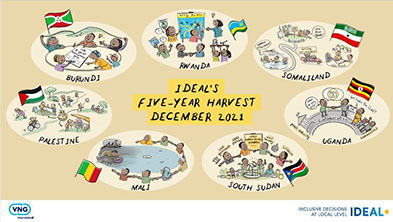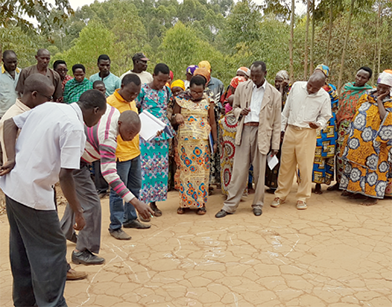Annual Update 2022 VNG International
‘LGAs in most IDEAL countries have found the support of VNGi highly relevant. In most countries in IDEAL, LGA actors underline VNGi has been crucial to their evolution, the development of coherent strategies, and a re-orientation on their mission’
Wageningen University,
Final Evaluator of the IDEAL Programme
‘…We were supported in engaging the community that we are planning for, aware that the land on which the Municipal Physical Plans are being done belongs to the community. We got to appreciate that community engagement is key, because we were able to pick the roads for better connectivity and access, we marked the garbage sites, mapped, and numbered the plots for proper property identification. We think the physical plan is going to help the Municipality develop the area in a better and orderly manner…’
Baluku Wilfred,
Senior Physical Planner,
Kasese Municipality, Uganda
Burundi
More information:
More details about the programme: https://www.vng-international.nl/ideal-inclusive-decisions-local-level
https://www.youtube.com/watch?v=FSup7jsYABs
(video Somaliland)
https://www.youtube.com/watch?v=nb4PvrR2UwQ (video Burundi)
About the gender approach in the programme:
A toolkit for leaders and change makers in local governments: https://www.vng-international.nl/sites/default/files/2021-03/Toolkit%20Leadership%2001032021.pdf
To be inserted: link to latest IDEAL publication


Involving Citizens in Decision Making by strengthening democratic local government
Featured Project
Various countries,
IDEAL programme
The IDEAL programme implemented in seven countries (Burundi, Mali, Palestine, Rwanda, Somaliland, South Sudan and Uganda) that face a unique combination of challenges and varying ability to manage them. They exhibit similar social, economic and political characteristics that qualify them as fragile and conflict affected states. IDEAL focused on inclusive governance and improving the social contract, with the aim of better equipping municipalities to deal with fragility risks. The programme experimented with and identified various means of strengthening the social contract in countries where governments have limited capacity and/or lack the will to carry out basic functions in an effective and inclusive manner.
The involvement of citizens, especially marginalized groups, in decision-making ensured that their needs and opinions were reflected in policy, eventually resulting in more responsive services. To realize the goals of IDEAL, we worked together with 7 national/regional associations of municipalities and especially in Uganda and Rwanda with the input from several Dutch municipalities.
Main Results achieved:
- Burundi: the commune of Vyanda has seen a large increase in tax income after having received several trainings on mobilising communal finances, their management and participatory budgeting by the IDEAL programme. To raise support for tax collection through transparency, the community and the commune made a commitment and action plan including i) awareness raising ii) identification of taxable materials iii) the organisation of tax collection with the involvement of young people and iv) regular communication regarding revenue collection by showing the communal budget every three months. Before, the commune of Vyanda was only able to cover the salaries of its staff for 9 months. After just one year, they are now able to pay their staff regularly and generate a surplus for investments. Their income multiplied 9 times.
- Mali: trainings on resource mobilisation and taxation systems have also led to several inspiring initiatives. In the communes of Méguétan and Kouoro there are many sand- and gravel miners active. These are often individual minors that extract sand and gravel (often illegally) while damaging the environment and polluting the water. This causes negative health effects and conflicts between water users and miners. In addition, the communes had minimal control or overview over these activities and they were unaware of the formal roles and responsibilities they had. There was no collaboration and/or communication at all between the miners, nor other water users and/or the communes. The IDEAL programme brought these different people together and organized trainings on the different roles and responsibilities of each group. This resulted in a collaboration between the commune and the miners: a cooperative. In Méguétan, at first the miners did not want to pay taxes. However, after the commune installed a permanent consultation framework with the cooperative – where they can express their needs and are informed about how the taxes are spent – they agreed to pay. In addition, the communes have indicated a few dedicated areas where miners are allowed – and where not – to exploit sand and gravel. They make sure that environmentally fragile areas now stay clear of these activities.
- Somaliland: In 2021, after several consultation rounds with all stakeholders and their unanimous decision, the IDEAL team together with the local government association ALGASL succeeded to physically establish inclusive economic development forums in Baligubadle, Zeila and Lasanod. The forums include all sectors of society, civil society organizations, SMEs, large-corporate businesses, other private sector actors and the district council administration. The LED forum provides a platform whereby members openly discuss economic issues and use it as the driving force behind the local economic development for their district or wider region.
- Uganda: with health care service provision being a major concern for the community in Koboko Municipality as a result of the influx of refugees, IDEAL facilitated Community feedback engagements with the Municipality authorities. With no funds to set up a new health facility, the Municipality was drawn to engage with the community on possible avenues of dealing with this challenge. In one of these engagements, the community put the Municipal authorities to task and offered to surrender their (former grazing) land measuring about 8 acres on condition that the Municipal authorities lobby the Government (Ministry of Health) and development partners for funding to put up a Health Center III as an auxiliary service point. The Ministry of Health was engaged to mobilize funds through partners and by the end of 2020, Lasanga Health Center III was already providing outpatient services, pre- and post-natal services and community health support to a big section of the community in Koboko.
- South Sudan: to support more inclusive and participatory decision-making processes, on WASH services delivery in the target counties, CSOs trained Water Management Committees (WMCs) in the targeted counties, on their roles, rights and responsibilities, which has helped them to improve in engaging and collaborating with the Local Government and take ownerships for their water users. Via IDEAL grants the WMCs were able to bring their newly gained knowledge into practice. In 2021 the results from these trainings became clear: selected WMCs were able to take lead in the ownership and management of their water points and effectively contribute to the cost of maintenance. Cooperation between the LGs and WMCs improved significantly. There are now many examples where WMCs report technical flaws of boreholes to the LGs, who, in response, prioritized the repair of these boreholes.